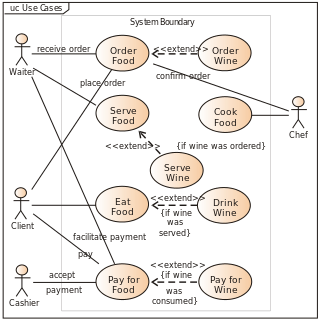Object Management Group
 | |
| Abbreviation | OMG |
|---|---|
| Formation | 1989 |
| Headquarters |
109 Highland Ave Needham, Massachusetts |
| Website |
www |
The Object Management Group (OMG) The Object Management Group® (OMG®) is an international, open membership, not-for-profit computer industry standards consortium with representation from government, industry and academia. OMG Task Forces develop enterprise integration standards for a wide range of technologies and an even wider range of industries. OMG modeling standards enable powerful visual design, execution and maintenance of software and other processes.
Overview
OMG provides only specifications, and does not provide implementations. But before a specification can be accepted as a standard by OMG, the members of the submitter team must guarantee that they will bring a conforming product to market within a year. This is an attempt to prevent unimplemented (and unimplementable) standards.
Other private companies or open source groups are encouraged to produce conforming products and OMG is attempting to develop mechanisms to enforce true interoperability.
OMG hosts four technical meetings for its members and interested nonmembers. The Technical Meetings provide a neutral forum to discuss, develop and adopt standards that enable software interoperability for a wide range of industries including: business, finance, manufacturing, healthcare, robotics, software-based communications, security, government, space and more. Additionally, OMG holds four technical meetings per year. More information about these meetings can be found on the events page of their website.
History
Founded in 1989 by eleven companies (including Hewlett-Packard, IBM, Sun Microsystems, Apple Computer, American Airlines, iGrafx, and Data General), OMG's initial focus was to create a heterogeneous distributed object standard. The founding executive team included Christopher Stone and John Slitz. As of November 2012, the leadership includes Chairman and CEO Richard Soley, President and COO Bill Hoffman and Vice President and Technical Director Larry L. Johnson.
Since 2000, OMG international headquarters has been located in Needham, Massachusetts. In November 2012, the headquarters was moved from 140 Kendrick St to 109 Highland Ave.

The goal was a common portable and interoperable object model with methods and data that work using all types of development environments on all types of platforms.
In 1997, the Unified Modeling Language (UML) was added to the list of OMG adopted technologies. UML is a standardized general-purpose modeling language in the field of object-oriented software engineering.
In June 2005, the Business Process Management Initiative (BPMI.org) and OMG announced the merger of their respective Business Process Management (BPM) activities to form the Business Modeling and Integration Domain Task Force (BMI DTF).
In 2006 the Business Process Model and Notation (BPMN) was adopted as a standard by OMG.
In 2007 the Business Motivation Model (BMM) was adopted as a standard by the OMG. The BMM is a metamodel that provides a vocabulary for corporate governance and strategic planning and is particularly relevant to businesses undertaking governance, regulatory compliance, business transformation and strategic planning activities.
In 2009 OMG, together with the Software Engineering Institute at Carnegie Mellon, launched the Consortium of IT Software Quality (CISQ). CISQ brings together industry executives from Global 2000 IT organizations, system integrators, outsourcers, and package vendors to jointly address the challenge of standardizing the measurement of IT software quality and to promote a market-based ecosystem to support its deployment.
In 2011 OMG formed the Cloud Standards Customer Council.[1] Founding sponsors included CA, IBM, Kaavo, Rackspace and Software AG. The CSCC is an OMG end user advocacy group dedicated to accelerating cloud's successful adoption, and drilling down into the standards, security and interoperability issues surrounding the transition to the cloud. The Council is not a standards organization, but will complement existing cloud standards efforts and establish a core set of client-driven requirements to ensure cloud users will have the same freedom of choice, flexibility, and openness they have with traditional IT environments. CSCC is open to all end-user organizations.
In September 2011, the OMG Board of Directors unanimously voted to adopt the Vector Signal and Image Processing Library (VSIPL) as the latest OMG specification. Work for adopting the specification was led by Mentor Graphics' Embedded Software Division, RunTime Computing Solutions, The Mitre Corporation as well as the High Performance Embedded Computing Software Initiative (HPEC-SI). VSIPL is an application programming interface (API) defined by an open standard developed by embedded signal and image processing hardware and software vendors, academia, application developers, and government labs. VSIPL and VSIPL++ contain hundreds of functions used for common signal processing kernel and other computations. These functions include basic arithmetic, trigonometric, transcendental, signal processing, linear algebra, and image processing. The VSIPL family of libraries has been implemented by multiple vendors for a range of processor architectures, including x86, PowerPC, Cell, and NVIDIA GPUs. VSIPL and VSIPL++ are designed to achieve high performance, increase programmer productivity and maintain portability across a range of processor architectures. Additionally, VSIPL++ was designed from the start to include support for parallelism.
Late 2012 early 2013, The Object Management Group Board of Directors adopted the Automated Function Point (AFP) specification.[2] The push for adoption was led by the Consortium for IT Software Quality (CISQ). AFP provides a standard for automating the popular function point measure according to the counting guidelines of the International Function Point User Group (IFPUG).
On March 27 2014, OMG announced it would be managing the newly formed Industrial Internet Consortium (IIC). An open-membership, not-for-profit, the IIC will take the lead in establishing interoperability across industrial environments for a more connected world.[3]
Managed Programs
The Industrial Internet Consortium® (IIC™) is the world’s leading membership program transforming business and society by accelerating the Industrial Internet of Things (IIoT). Its mission is to accelerate growth of the Industrial Internet by coordinating ecosystem initiatives to connect and integrate objects with people, processes and data using common architectures, interoperability and open standards that lead to transformational business outcomes. Launched in 2014 by AT&T, Cisco, GE, IBM and Intel, the IIC delivers a trustworthy IIoT in which the world’s systems and devices are securely connected and controlled to deliver transformational outcomes[4].
The Consortium for IT Software Quality™ (CISQ™) is an IT leadership group that develops international standards for automating the measurement of software size and structural quality from the source code. The standards written by CISQ enable IT and business leaders to measure the risk IT applications pose to the business, as well as estimate the cost of ownership. CISQ was co-founded by the Object Management Group and Software Engineering Institute (SEI) at Carnegie Mellon University[5]. More information is available on their website.
Ratified ISO Standards
Of the many standards maintained by the OMG, 11 have been ratified as ISO standards.[6] These standards are:
Certification
OMG offers a number of professional certifications:
Notes
- ↑ Cloud Standards Customer Council
- ↑ Julie Pike (2013-01-17). "OMG Adopts Automated Function Point Specification". OMG. Retrieved August 13, 2016.
- ↑ Julie Pike (2014-03-27). "OMG to Manage the Industrial Internet Consortium". OMG. Retrieved August 13, 2016.
- ↑ "About Us | Industrial Internet Consortium". www.iiconsortium.org. Retrieved 2018-10-12.
- ↑ "CISQ FAQs | CISQ - Consortium for IT Software Quality". it-cisq.org. Retrieved 2018-10-12.
- ↑ http://themeforest.net/user/dan_fisher. "OMG Specifications are ISO Standards | Object Management Group". www.omg.org. Retrieved 2018-10-11.
- ↑ OCEB - OMG Certified Expert in Business Process Management (BPM)
- ↑ OCUP - OMG Certified UML Professional
- ↑ OCSMP - OMG Certified Systems Modeling Professional
- ↑ OCRES - OMG Certified Real-time and Embedded Systems Specialist
References
- This article is based on material taken from Object Management Group at the Free On-line Dictionary of Computing prior to 1 November 2008 and incorporated under the "relicensing" terms of the GFDL, version 1.3 or later.
